English 120: A Comprehensive Analysis of Global Climate Change Policy
VerifiedAdded on 2023/05/29
|5
|1362
|172
Essay
AI Summary
This essay, written for an English 120 course, argues for the necessity of a global climate change policy to address the growing impacts of severe weather events and climate change. It highlights the failures of voluntary agreements like the Kyoto Protocol and the Paris Agreement, emphasizing the need for binding international laws with strict enforcement and penalties for violations. The essay draws parallels to existing international laws regarding atrocity crimes and trade, arguing that a global policy would ensure equitable accountability for all nations. It also discusses the importance of incentivizing companies to adopt sustainable policies through tax breaks and other means, as well as the growing role of investors in promoting sustainable practices. The author concludes that a global climate change policy is essential for protecting the planet for future generations, holding all countries accountable, and promoting environmental sustainability.
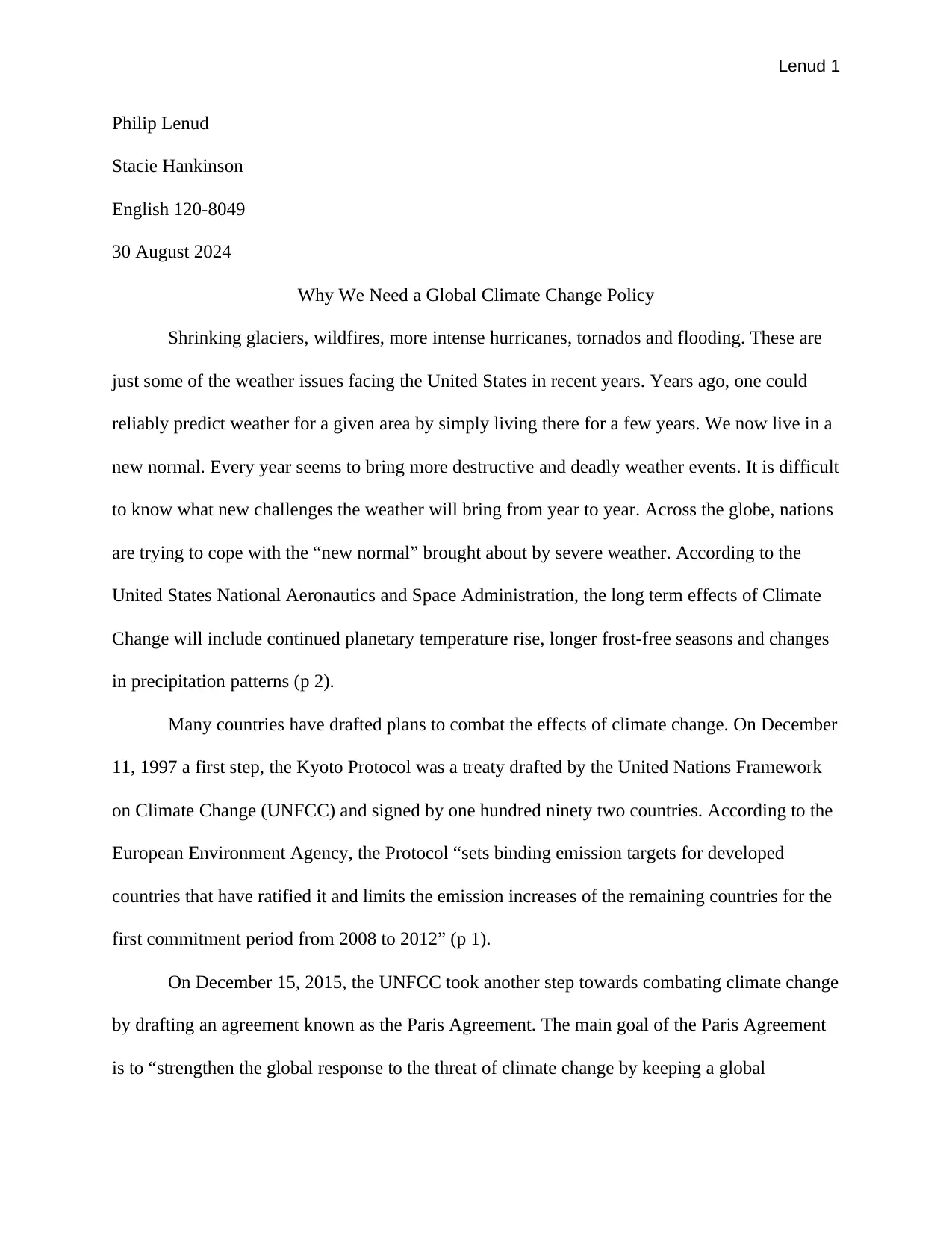
Lenud 1
Philip Lenud
Stacie Hankinson
English 120-8049
30 August 2024
Why We Need a Global Climate Change Policy
Shrinking glaciers, wildfires, more intense hurricanes, tornados and flooding. These are
just some of the weather issues facing the United States in recent years. Years ago, one could
reliably predict weather for a given area by simply living there for a few years. We now live in a
new normal. Every year seems to bring more destructive and deadly weather events. It is difficult
to know what new challenges the weather will bring from year to year. Across the globe, nations
are trying to cope with the “new normal” brought about by severe weather. According to the
United States National Aeronautics and Space Administration, the long term effects of Climate
Change will include continued planetary temperature rise, longer frost-free seasons and changes
in precipitation patterns (p 2).
Many countries have drafted plans to combat the effects of climate change. On December
11, 1997 a first step, the Kyoto Protocol was a treaty drafted by the United Nations Framework
on Climate Change (UNFCC) and signed by one hundred ninety two countries. According to the
European Environment Agency, the Protocol “sets binding emission targets for developed
countries that have ratified it and limits the emission increases of the remaining countries for the
first commitment period from 2008 to 2012” (p 1).
On December 15, 2015, the UNFCC took another step towards combating climate change
by drafting an agreement known as the Paris Agreement. The main goal of the Paris Agreement
is to “strengthen the global response to the threat of climate change by keeping a global
Philip Lenud
Stacie Hankinson
English 120-8049
30 August 2024
Why We Need a Global Climate Change Policy
Shrinking glaciers, wildfires, more intense hurricanes, tornados and flooding. These are
just some of the weather issues facing the United States in recent years. Years ago, one could
reliably predict weather for a given area by simply living there for a few years. We now live in a
new normal. Every year seems to bring more destructive and deadly weather events. It is difficult
to know what new challenges the weather will bring from year to year. Across the globe, nations
are trying to cope with the “new normal” brought about by severe weather. According to the
United States National Aeronautics and Space Administration, the long term effects of Climate
Change will include continued planetary temperature rise, longer frost-free seasons and changes
in precipitation patterns (p 2).
Many countries have drafted plans to combat the effects of climate change. On December
11, 1997 a first step, the Kyoto Protocol was a treaty drafted by the United Nations Framework
on Climate Change (UNFCC) and signed by one hundred ninety two countries. According to the
European Environment Agency, the Protocol “sets binding emission targets for developed
countries that have ratified it and limits the emission increases of the remaining countries for the
first commitment period from 2008 to 2012” (p 1).
On December 15, 2015, the UNFCC took another step towards combating climate change
by drafting an agreement known as the Paris Agreement. The main goal of the Paris Agreement
is to “strengthen the global response to the threat of climate change by keeping a global
Paraphrase This Document
Need a fresh take? Get an instant paraphrase of this document with our AI Paraphraser
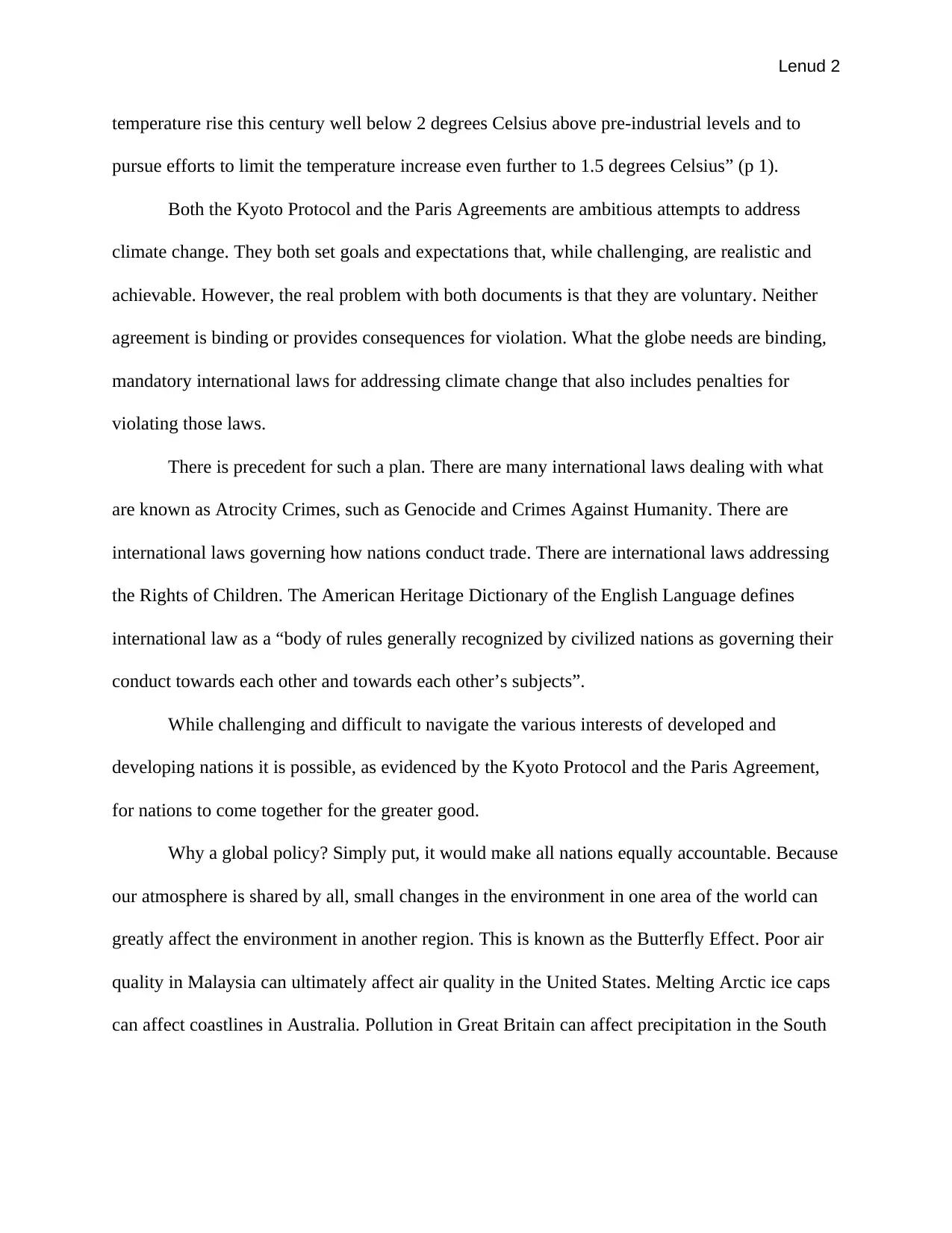
Lenud 2
temperature rise this century well below 2 degrees Celsius above pre-industrial levels and to
pursue efforts to limit the temperature increase even further to 1.5 degrees Celsius” (p 1).
Both the Kyoto Protocol and the Paris Agreements are ambitious attempts to address
climate change. They both set goals and expectations that, while challenging, are realistic and
achievable. However, the real problem with both documents is that they are voluntary. Neither
agreement is binding or provides consequences for violation. What the globe needs are binding,
mandatory international laws for addressing climate change that also includes penalties for
violating those laws.
There is precedent for such a plan. There are many international laws dealing with what
are known as Atrocity Crimes, such as Genocide and Crimes Against Humanity. There are
international laws governing how nations conduct trade. There are international laws addressing
the Rights of Children. The American Heritage Dictionary of the English Language defines
international law as a “body of rules generally recognized by civilized nations as governing their
conduct towards each other and towards each other’s subjects”.
While challenging and difficult to navigate the various interests of developed and
developing nations it is possible, as evidenced by the Kyoto Protocol and the Paris Agreement,
for nations to come together for the greater good.
Why a global policy? Simply put, it would make all nations equally accountable. Because
our atmosphere is shared by all, small changes in the environment in one area of the world can
greatly affect the environment in another region. This is known as the Butterfly Effect. Poor air
quality in Malaysia can ultimately affect air quality in the United States. Melting Arctic ice caps
can affect coastlines in Australia. Pollution in Great Britain can affect precipitation in the South
temperature rise this century well below 2 degrees Celsius above pre-industrial levels and to
pursue efforts to limit the temperature increase even further to 1.5 degrees Celsius” (p 1).
Both the Kyoto Protocol and the Paris Agreements are ambitious attempts to address
climate change. They both set goals and expectations that, while challenging, are realistic and
achievable. However, the real problem with both documents is that they are voluntary. Neither
agreement is binding or provides consequences for violation. What the globe needs are binding,
mandatory international laws for addressing climate change that also includes penalties for
violating those laws.
There is precedent for such a plan. There are many international laws dealing with what
are known as Atrocity Crimes, such as Genocide and Crimes Against Humanity. There are
international laws governing how nations conduct trade. There are international laws addressing
the Rights of Children. The American Heritage Dictionary of the English Language defines
international law as a “body of rules generally recognized by civilized nations as governing their
conduct towards each other and towards each other’s subjects”.
While challenging and difficult to navigate the various interests of developed and
developing nations it is possible, as evidenced by the Kyoto Protocol and the Paris Agreement,
for nations to come together for the greater good.
Why a global policy? Simply put, it would make all nations equally accountable. Because
our atmosphere is shared by all, small changes in the environment in one area of the world can
greatly affect the environment in another region. This is known as the Butterfly Effect. Poor air
quality in Malaysia can ultimately affect air quality in the United States. Melting Arctic ice caps
can affect coastlines in Australia. Pollution in Great Britain can affect precipitation in the South
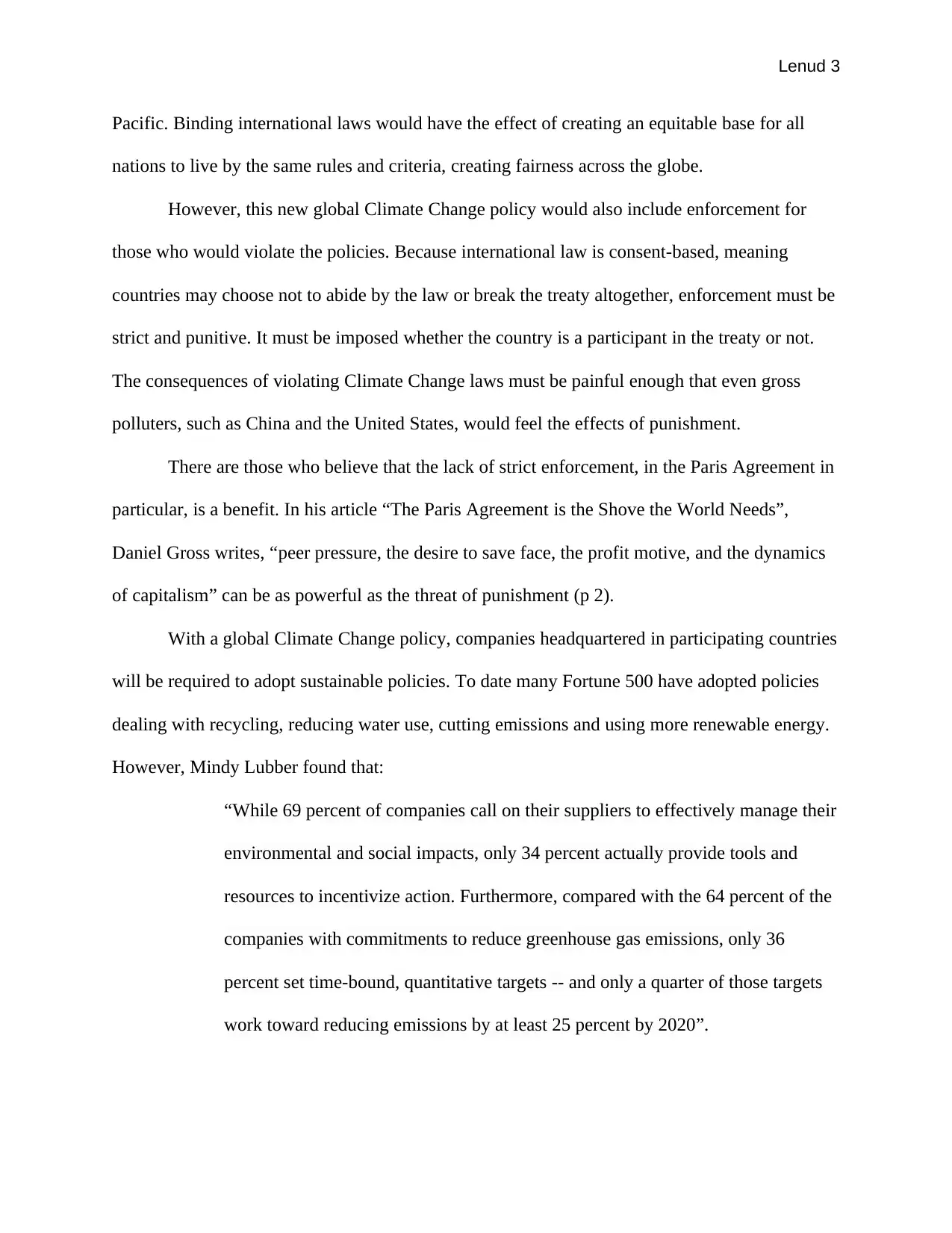
Lenud 3
Pacific. Binding international laws would have the effect of creating an equitable base for all
nations to live by the same rules and criteria, creating fairness across the globe.
However, this new global Climate Change policy would also include enforcement for
those who would violate the policies. Because international law is consent-based, meaning
countries may choose not to abide by the law or break the treaty altogether, enforcement must be
strict and punitive. It must be imposed whether the country is a participant in the treaty or not.
The consequences of violating Climate Change laws must be painful enough that even gross
polluters, such as China and the United States, would feel the effects of punishment.
There are those who believe that the lack of strict enforcement, in the Paris Agreement in
particular, is a benefit. In his article “The Paris Agreement is the Shove the World Needs”,
Daniel Gross writes, “peer pressure, the desire to save face, the profit motive, and the dynamics
of capitalism” can be as powerful as the threat of punishment (p 2).
With a global Climate Change policy, companies headquartered in participating countries
will be required to adopt sustainable policies. To date many Fortune 500 have adopted policies
dealing with recycling, reducing water use, cutting emissions and using more renewable energy.
However, Mindy Lubber found that:
“While 69 percent of companies call on their suppliers to effectively manage their
environmental and social impacts, only 34 percent actually provide tools and
resources to incentivize action. Furthermore, compared with the 64 percent of the
companies with commitments to reduce greenhouse gas emissions, only 36
percent set time-bound, quantitative targets -- and only a quarter of those targets
work toward reducing emissions by at least 25 percent by 2020”.
Pacific. Binding international laws would have the effect of creating an equitable base for all
nations to live by the same rules and criteria, creating fairness across the globe.
However, this new global Climate Change policy would also include enforcement for
those who would violate the policies. Because international law is consent-based, meaning
countries may choose not to abide by the law or break the treaty altogether, enforcement must be
strict and punitive. It must be imposed whether the country is a participant in the treaty or not.
The consequences of violating Climate Change laws must be painful enough that even gross
polluters, such as China and the United States, would feel the effects of punishment.
There are those who believe that the lack of strict enforcement, in the Paris Agreement in
particular, is a benefit. In his article “The Paris Agreement is the Shove the World Needs”,
Daniel Gross writes, “peer pressure, the desire to save face, the profit motive, and the dynamics
of capitalism” can be as powerful as the threat of punishment (p 2).
With a global Climate Change policy, companies headquartered in participating countries
will be required to adopt sustainable policies. To date many Fortune 500 have adopted policies
dealing with recycling, reducing water use, cutting emissions and using more renewable energy.
However, Mindy Lubber found that:
“While 69 percent of companies call on their suppliers to effectively manage their
environmental and social impacts, only 34 percent actually provide tools and
resources to incentivize action. Furthermore, compared with the 64 percent of the
companies with commitments to reduce greenhouse gas emissions, only 36
percent set time-bound, quantitative targets -- and only a quarter of those targets
work toward reducing emissions by at least 25 percent by 2020”.
⊘ This is a preview!⊘
Do you want full access?
Subscribe today to unlock all pages.

Trusted by 1+ million students worldwide
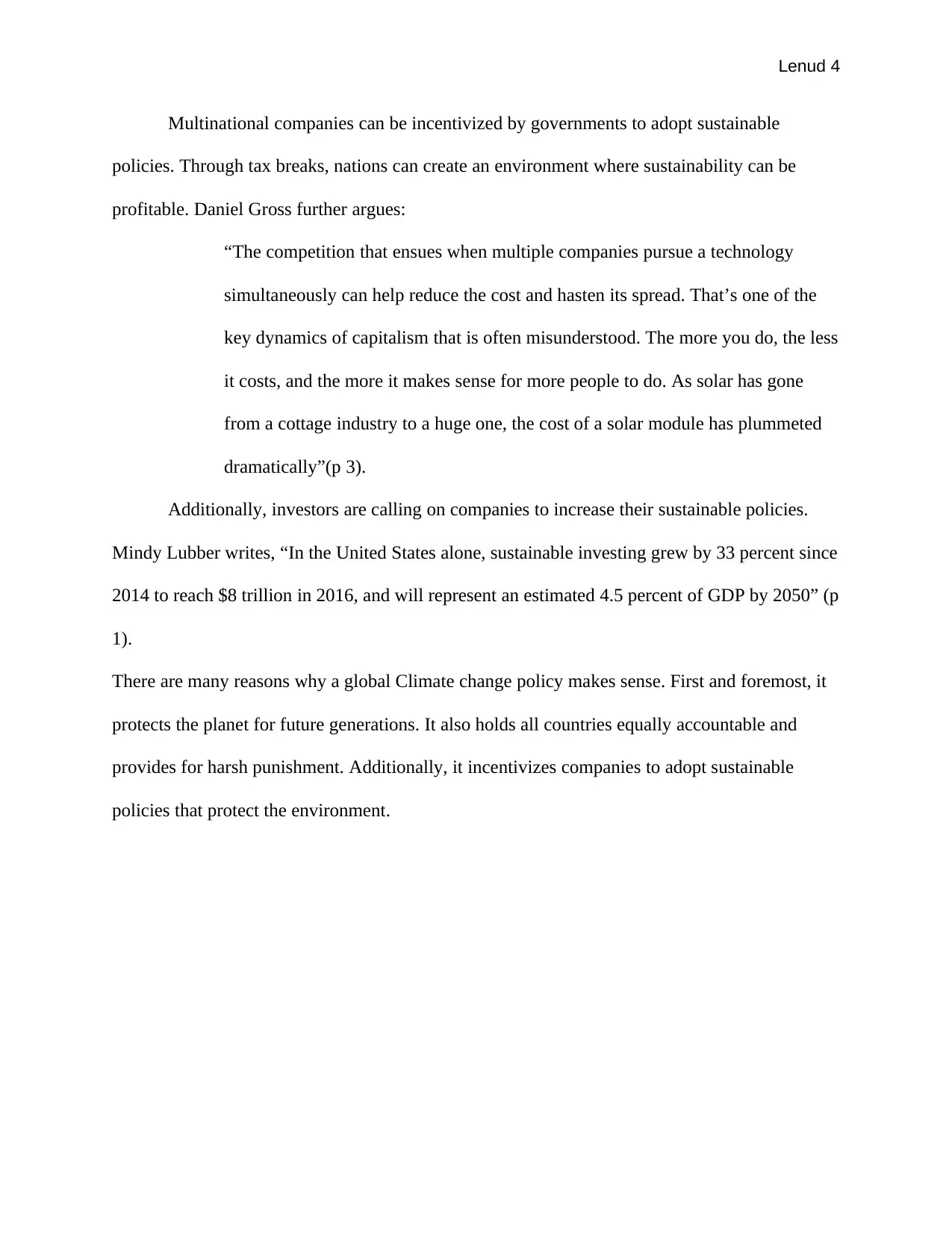
Lenud 4
Multinational companies can be incentivized by governments to adopt sustainable
policies. Through tax breaks, nations can create an environment where sustainability can be
profitable. Daniel Gross further argues:
“The competition that ensues when multiple companies pursue a technology
simultaneously can help reduce the cost and hasten its spread. That’s one of the
key dynamics of capitalism that is often misunderstood. The more you do, the less
it costs, and the more it makes sense for more people to do. As solar has gone
from a cottage industry to a huge one, the cost of a solar module has plummeted
dramatically”(p 3).
Additionally, investors are calling on companies to increase their sustainable policies.
Mindy Lubber writes, “In the United States alone, sustainable investing grew by 33 percent since
2014 to reach $8 trillion in 2016, and will represent an estimated 4.5 percent of GDP by 2050” (p
1).
There are many reasons why a global Climate change policy makes sense. First and foremost, it
protects the planet for future generations. It also holds all countries equally accountable and
provides for harsh punishment. Additionally, it incentivizes companies to adopt sustainable
policies that protect the environment.
Multinational companies can be incentivized by governments to adopt sustainable
policies. Through tax breaks, nations can create an environment where sustainability can be
profitable. Daniel Gross further argues:
“The competition that ensues when multiple companies pursue a technology
simultaneously can help reduce the cost and hasten its spread. That’s one of the
key dynamics of capitalism that is often misunderstood. The more you do, the less
it costs, and the more it makes sense for more people to do. As solar has gone
from a cottage industry to a huge one, the cost of a solar module has plummeted
dramatically”(p 3).
Additionally, investors are calling on companies to increase their sustainable policies.
Mindy Lubber writes, “In the United States alone, sustainable investing grew by 33 percent since
2014 to reach $8 trillion in 2016, and will represent an estimated 4.5 percent of GDP by 2050” (p
1).
There are many reasons why a global Climate change policy makes sense. First and foremost, it
protects the planet for future generations. It also holds all countries equally accountable and
provides for harsh punishment. Additionally, it incentivizes companies to adopt sustainable
policies that protect the environment.
Paraphrase This Document
Need a fresh take? Get an instant paraphrase of this document with our AI Paraphraser
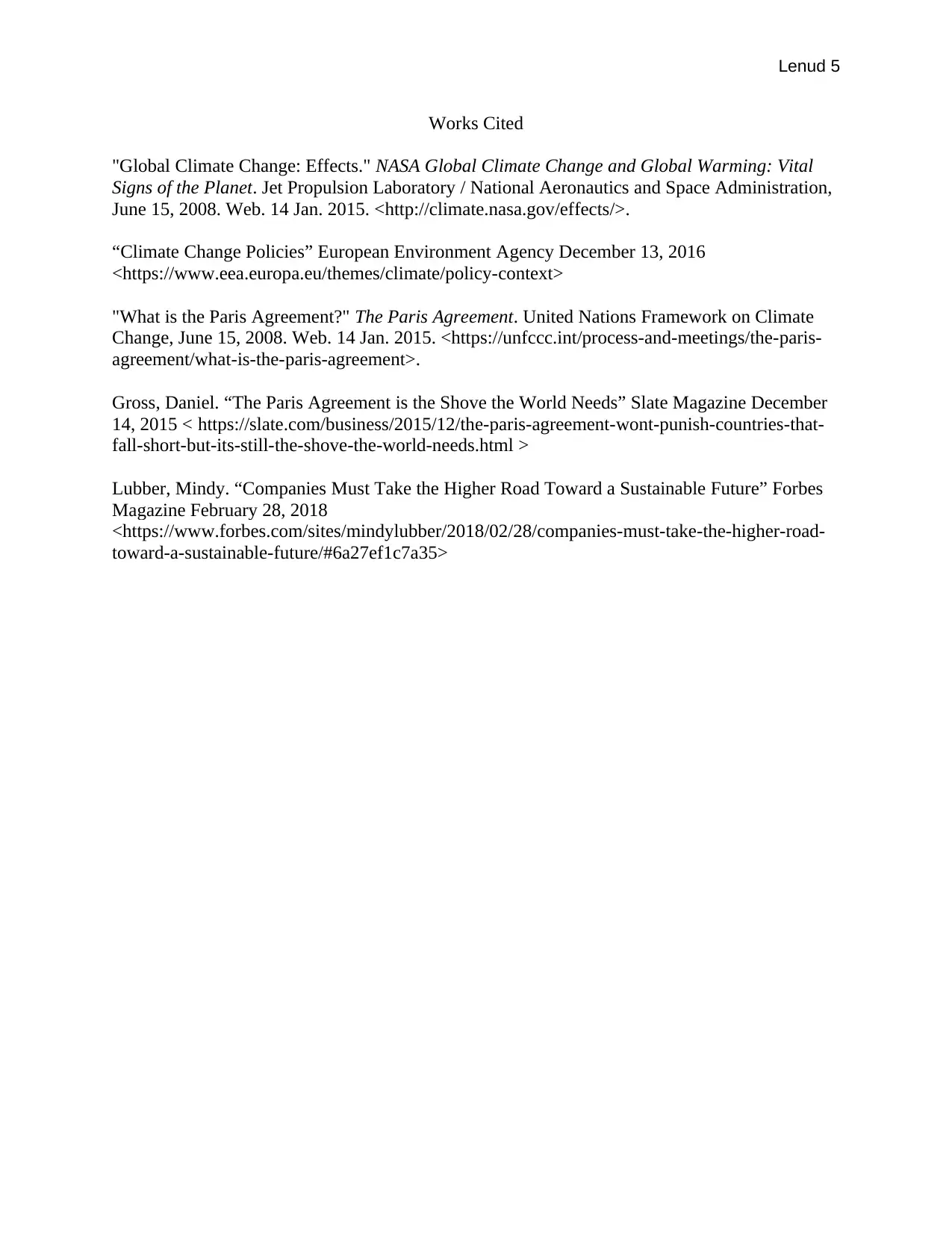
Lenud 5
Works Cited
"Global Climate Change: Effects." NASA Global Climate Change and Global Warming: Vital
Signs of the Planet. Jet Propulsion Laboratory / National Aeronautics and Space Administration,
June 15, 2008. Web. 14 Jan. 2015. <http://climate.nasa.gov/effects/>.
“Climate Change Policies” European Environment Agency December 13, 2016
<https://www.eea.europa.eu/themes/climate/policy-context>
"What is the Paris Agreement?" The Paris Agreement. United Nations Framework on Climate
Change, June 15, 2008. Web. 14 Jan. 2015. <https://unfccc.int/process-and-meetings/the-paris-
agreement/what-is-the-paris-agreement>.
Gross, Daniel. “The Paris Agreement is the Shove the World Needs” Slate Magazine December
14, 2015 < https://slate.com/business/2015/12/the-paris-agreement-wont-punish-countries-that-
fall-short-but-its-still-the-shove-the-world-needs.html >
Lubber, Mindy. “Companies Must Take the Higher Road Toward a Sustainable Future” Forbes
Magazine February 28, 2018
<https://www.forbes.com/sites/mindylubber/2018/02/28/companies-must-take-the-higher-road-
toward-a-sustainable-future/#6a27ef1c7a35>
Works Cited
"Global Climate Change: Effects." NASA Global Climate Change and Global Warming: Vital
Signs of the Planet. Jet Propulsion Laboratory / National Aeronautics and Space Administration,
June 15, 2008. Web. 14 Jan. 2015. <http://climate.nasa.gov/effects/>.
“Climate Change Policies” European Environment Agency December 13, 2016
<https://www.eea.europa.eu/themes/climate/policy-context>
"What is the Paris Agreement?" The Paris Agreement. United Nations Framework on Climate
Change, June 15, 2008. Web. 14 Jan. 2015. <https://unfccc.int/process-and-meetings/the-paris-
agreement/what-is-the-paris-agreement>.
Gross, Daniel. “The Paris Agreement is the Shove the World Needs” Slate Magazine December
14, 2015 < https://slate.com/business/2015/12/the-paris-agreement-wont-punish-countries-that-
fall-short-but-its-still-the-shove-the-world-needs.html >
Lubber, Mindy. “Companies Must Take the Higher Road Toward a Sustainable Future” Forbes
Magazine February 28, 2018
<https://www.forbes.com/sites/mindylubber/2018/02/28/companies-must-take-the-higher-road-
toward-a-sustainable-future/#6a27ef1c7a35>
1 out of 5
Related Documents
Your All-in-One AI-Powered Toolkit for Academic Success.
+13062052269
info@desklib.com
Available 24*7 on WhatsApp / Email
![[object Object]](/_next/static/media/star-bottom.7253800d.svg)
Unlock your academic potential
Copyright © 2020–2026 A2Z Services. All Rights Reserved. Developed and managed by ZUCOL.





